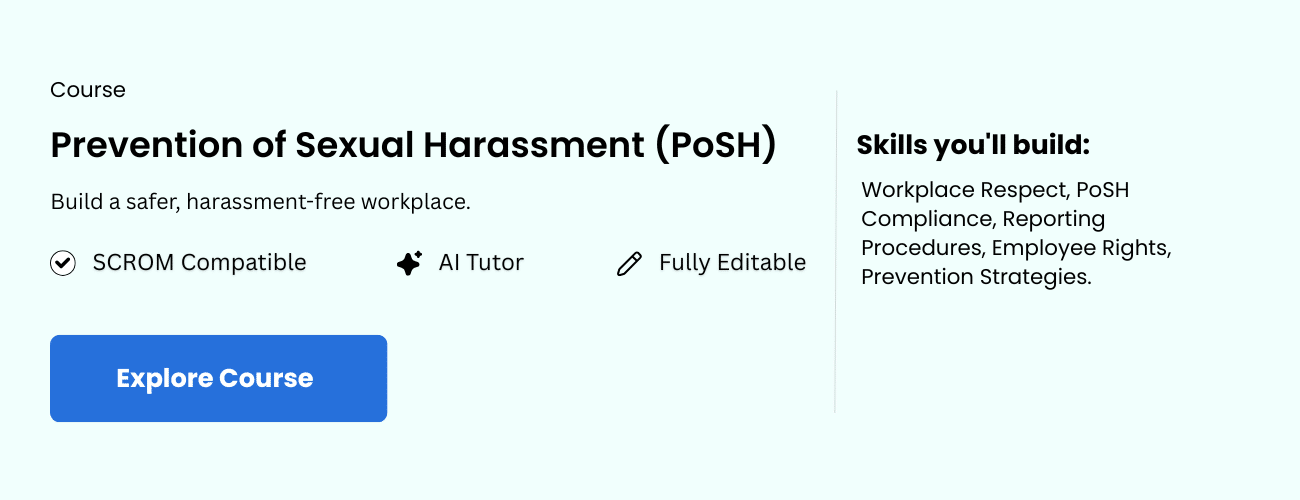
THANK YOU
FOR YOUR INFORMATION
One of our expert will be in touch with you…

Workplace safety is no longer optional—it’s a legal and ethical responsibility. With rising harassment cases and stricter compliance expectations from the government, every Indian organization must have a clear and well-implemented POSH Policy. But what exactly does it mean, who needs it, and how does it work?
This guide breaks down everything employers and employees must know.
A POSH Policy is an internal workplace policy created under the Sexual Harassment of Women at Workplace (Prevention, Prohibition and Redressal) Act, 2013, commonly known as the POSH Act. Its purpose is simple: to prevent sexual harassment, protect employees, and provide a structured complaint-handling process.
In short, the POSH Policy defines:
Every employer with 10 or more employees must legally have a POSH Policy in writing.
The Government of India mandates a POSH Policy to ensure a work culture where every employee—especially women—feels safe and respected. A compliant POSH Policy helps organizations:
Non-compliance can lead to penalties up to ₹50,000, business license cancellation, and legal proceedings.
A strong POSH Policy is built around three core goals:
Ensuring employees are aware of what constitutes harassment and how to maintain respectful interactions. This includes POSH training for employees, awareness sessions, posters, and communication.
Clearly defining unacceptable behaviors, boundaries, and consequences.
Providing a fair, unbiased, and time-bound complaint handling mechanism through the Internal Committee (IC).
A legally compliant POSH Policy includes:
Covers verbal, physical, visual, written, online, and implied misconduct.
Applies to:
Includes responsibilities of employers, employees, Internal Committee, and HR.
A step-by-step process that ensures fairness, neutrality, and compliance.
From warnings to termination depending on the severity of the misconduct.
Every employer must conduct:
Must Read: What is POSH training?
A well-executed POSH Policy leads to:
Many confuse the two, but they serve different purposes:
| POSH Policy | POSH Training |
|---|---|
| A written set of rules defining rights, responsibilities, and processes | Interactive sessions that teach employees how to follow the policy |
| Mandatory for all companies with 10+ employees | Mandatory annual training for all employees |
| Focuses on compliance | Focuses on awareness & prevention |
Both are essential for complete POSH compliance.

The policy applies to:
No exceptions — every person entering the workplace is covered.
Here’s a simplified step-by-step guide:
Include definitions, scope, reporting, investigation, and actions.
Mandatory if you have 10+ employees.
For employees, managers, and IC members.
Required by law in physical and virtual spaces.
Annual reports, training records, and case files.
Consistent communication, zero-tolerance practices, leadership involvement.
POSH training plays a crucial role in helping employees understand acceptable and unacceptable workplace behaviors. It creates awareness about different forms of sexual harassment verbal, physical, written, implied, and online—so employees know how to identify misconduct early. This knowledge empowers employees to maintain respectful communication and boundaries, ultimately reducing the chances of misunderstandings and conflicts.
Training also educates employees on their rights and responsibilities under the POSH Act. Many individuals hesitate to speak up simply because they are unaware of the complaint process or fear retaliation. POSH training removes this fear by clearly explaining how to report harassment, what the Internal Committee does, and how confidentiality is maintained throughout the process. This builds confidence and trust among employees, especially women and vulnerable groups.
Moreover, POSH training contributes directly to a healthier workplace culture. When employees understand the consequences of misconduct and the importance of respectful behavior, it fosters an environment where everyone feels safe, heard, and valued. This not only reduces harassment cases but also boosts morale, teamwork, engagement, and overall productivity leading to a more positive organizational reputation.
A POSH Policy is more than a legal formality—it’s the foundation of a respectful, safe, and inclusive workplace. By clearly defining expectations, responsibilities, and complaint processes, organizations can prevent misconduct and build a culture where employees feel confident and protected.
In today’s professional world, maintaining POSH compliance is not only a legal duty but a competitive advantage that enhances trust, productivity, and employer branding.